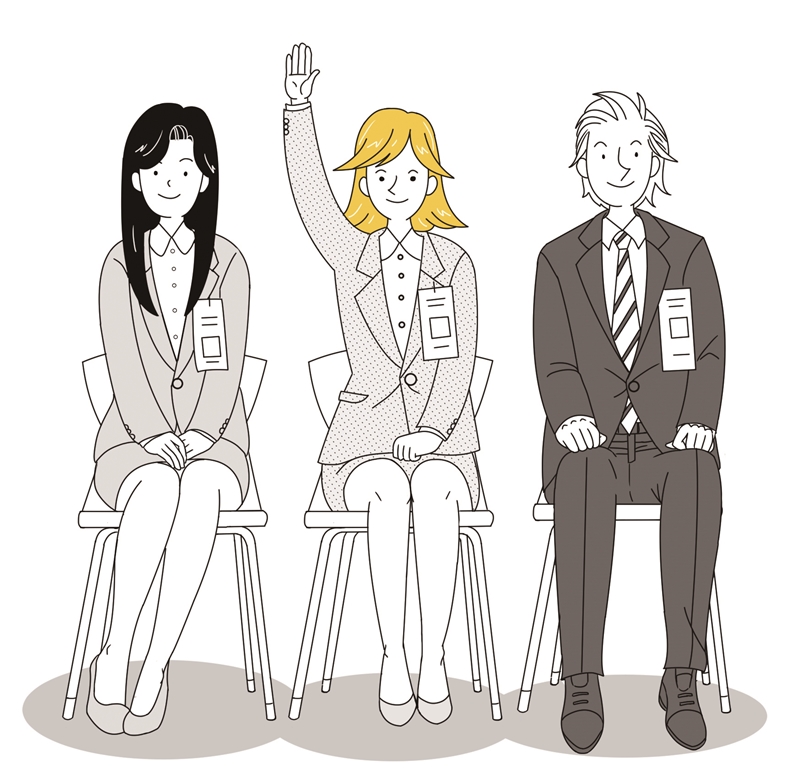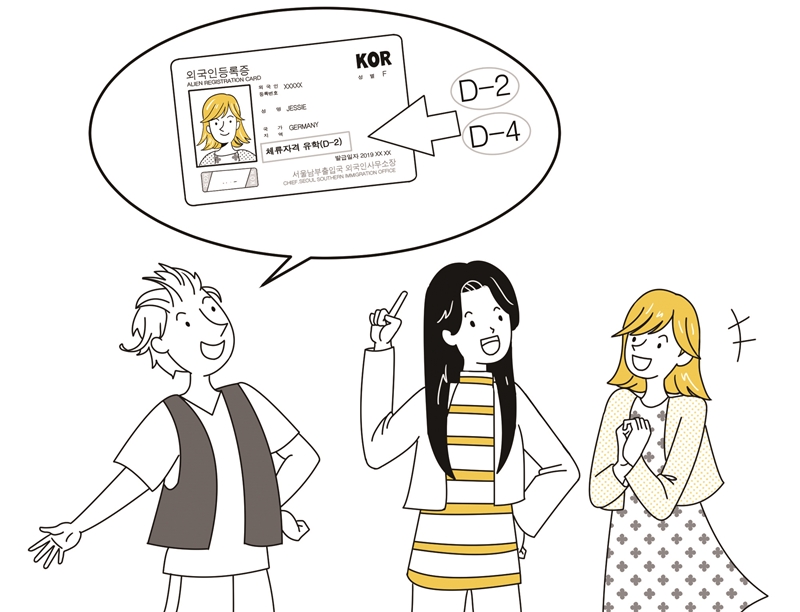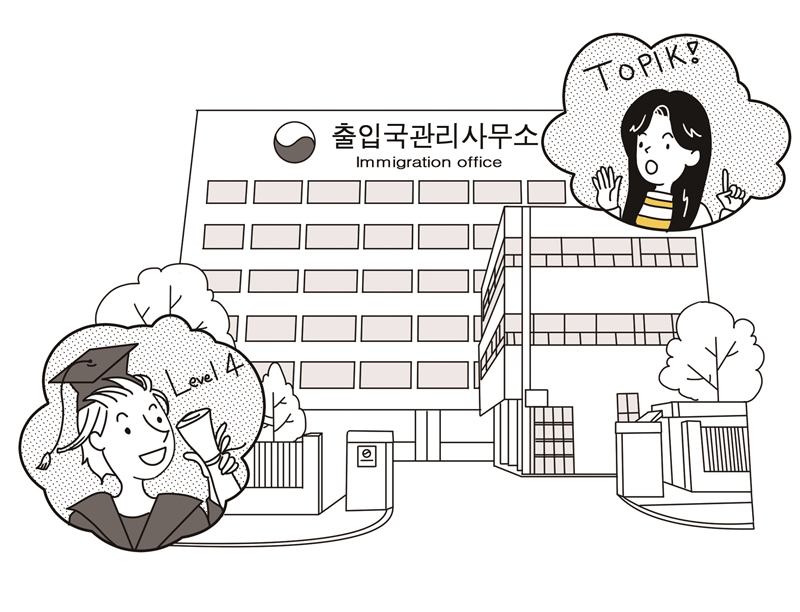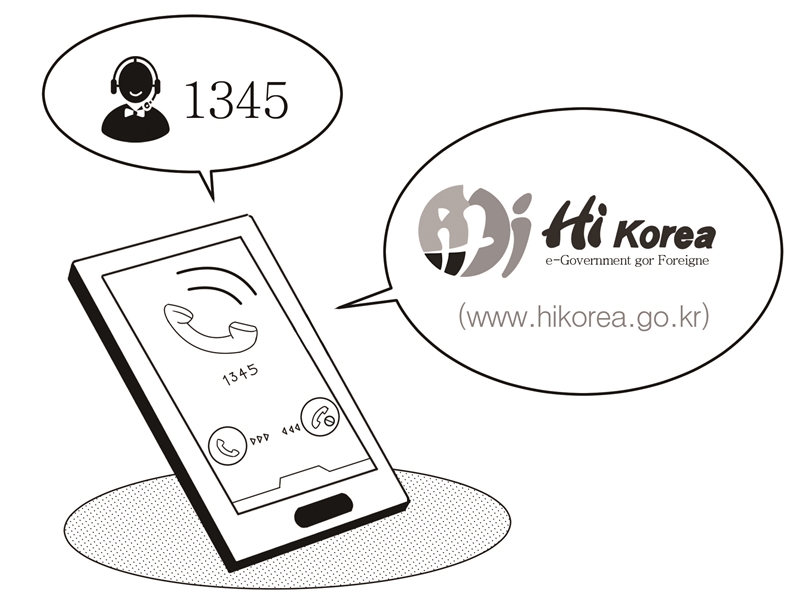_Logo.jpg)
Work tips for int'l students

|
Jessie is a German exchange student in Korea who has spent more of her savings than planned and needs to earn money. Can she legally work in Korea as a foreign student? This episode explains how a foreign national can work in the country depending on visa. |

Jessie: I spent too much over summer break, far more than planned based on the funds I brought from Germany. What can I do?
Pedro: Why not get a part-time job?
Jessie: Are exchange students eligible for part-time jobs?
Su-hyeon: Of course. They cannot work full time but they can part time.
Jessie: Wow, tell me more.
Pedro: Those with either a D-2 or D-4 visa are eligible for part-time jobs. (D-2 is for those pursuing a full-time degree such as a bachelor's, master's or doctorate in Korea, while D-4 is for those studying Korean at a language institute affiliated with a university).
Su-hyeon: Foreigners with these visas can work as translators or interpreters, staff at restaurants or offices, or assistants to tour guides or sales reps at a duty-free shop.
Jessie: Do they have to meet criteria to get these jobs?
Su-hyeon: Of course. You'll have to meet certain standards as a student.
Pedro: Those with an average GPA of below "C" or a class attendance rate of 70% or below during that semester can face restrictions when looking for part-time jobs. And if you haven't completed your degree within a given time frame due to a low GPA or other reasons and extended your visa to complete the degree, then you're ineligible to get a part-time job.

Jessie: I recently attained Level 4 in the Test of Proficiency in Korean (TOPIK). Do you think that'll make it easier for me to find a part-time job?
Pedro: Oh sure. The number of hours you're eligible to work here depends on your Korean-language proficiency.
Su-hyeon: For instance, freshmen and sophomores can work up to 20 hours per week during a semester if they gain Level 3 or higher on TOPIK, and they can work as much as they want during vacations. Those who haven't attained Level 3 can work only up to 10 hours per week regardless of semester or break.
Pedro: Juniors, seniors and graduate students need Level 4 or higher to work part time. They can work longer than freshmen and sophomores if they meet this criterion.
Jessie: Let's say I found a part-time job. Can I start work right away?
Su-hyeon: No, you first have to notify your immigration office of your qualifications for staying and your employment and get permission from the office.
Pedro: The site Hi Korea provides relevant information on this. Log onto this website, download a document for confirming the temporary employment of a foreign student, and get signatures from the international student officer at your school and your employer to start the approval process.
Jessie: So I guess that means I can start working part time only after I get such permission.
Su-hyeon: Yes.
Pedro: For those studying Korean at language schools affiliated with universities, they can begin working part time after they've been in Korea for at least six months. You should tell this to your foreign friends who are also seeking part-time jobs.

Jessie: What about getting prize money? I moonlight as an Honorary Reporter for Korea.net and write about my life in Korea. My article was recently selected for an award and I got a phone call from Korea.net saying I will receive prize money.
Pedro: Hmm, it says here that you don't need permission for activities that entail subsidiary or temporary financial reward or compensation. In the case of your Honorary Reporter activities, they involve temporary payments and don't violate your qualifications as a foreign student. Thus no permission is needed.
Su-hyeon: Wow, Jessie, it seems you've engaged in quite a few activities.
Jessie: Of course. I hope to get a job in Korea after finishing school here, so I must be diligent.
Pedro: If you seek training or employment in Korea after finishing school here, you can apply to change your visa to a D-10, which is a jobseeker visa.

Pedro: Because I'm a cook, I have an E-7 visa, which is issued to those engaged in specifically designated activities.
Su-hyeon: Korea has a variety of visas allowing foreigners to work legally. Foreign workers who come to Korea to work temporarily or migrant workers can find jobs in Korea.
Pedro: If you have questions, call the Immigration Contact Center at 1345 or visit its website at www.hikorea.go.kr/pt/main_en.pt.
Jessie: Thanks. I didn't know visas could be so complicated. I'll look up more details later.
Written by Min Yea-Ji
Translated by Lee Jihae
Illustrated by Yuhaill
jesimin@korea.kr
![[While in Korea] Episode 10 – Kimjang culture](/upload/content/image/919788d87e89464cac5ef8289c6ac535_20191204132222.jpg)
![[While in Korea] Episode 9 – Seshin and bathhouse culture](/upload/content/image/1d05570c6db54137b0a2e9fa11068b3f_20191106144320.jpg)
![[While in Korea] Episode 8 – Work tips for int'l students](/upload/content/image/1570155627700.jpg)
![[While in Korea] Episode 7 – Table manners](/upload/content/image/1568076457016.jpg)
![[While in Korea] Episode 6 – Proper etiquette at special events](/upload/content/image/1565157913682.jpg)
![[While in Korea] Episode 5 – Where to escape the summer heat](/upload/content/image/1561974297462.jpg)
![[While in Korea] Episode 4 – What to do in case of emergency](/upload/content/image/1559527330239.jpg)
![[While in Korea] Episode 3 – Driving in Korea](/upload/content/image/1556760396224.jpg)
![[While in Korea] Episode 2 – Opening a bank account](/upload/content/image/1554117679477.jpg)
![[While in Korea] Episode 1 - Getting mobile phone service](/upload/content/image/1552959724998.jpg)